As is our custom, this is the ninth posting of poems and napkin art first posted on our Think in the Morning Facebook page.
Private Alamo
Tom Chandler
O’er the ramparts I watch you come
gallantly streaming, buckskin
cornlikker stinking of texas.
There must be a simpler way, I plead
to make this silly sacrifice.
Why can’t we all just get along?
Maybe we could offer to hate ourselves,
budget more flowers, build them a jetport,
import their sweaters.
But the walls of the mission are dark
tonight, damp with immaculate purpose.
You tamp the coonskin lid down tight,
wait grinning to guzzle pure fire
even as cruel Santa Anna prepares,
pomading his glistening hair in the mirror.
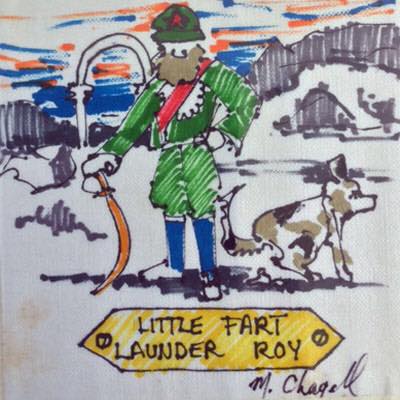
Sea Gull Cellar Bar Napkin Art, James Maxwell artist
Adventures of Isabel
Ogden Nash
Isabel met an enormous bear,
Isabel, Isabel, didn’t care;
The bear was hungry, the bear was ravenous,
The bear’s big mouth was cruel and cavernous.
The bear said, Isabel, glad to meet you,
How do, Isabel, now I’ll eat you!
Isabel, Isabel, didn’t worry.
Isabel didn’t scream or scurry.
She washed her hands and she straightened her hair up,
Then Isabel quietly ate the bear up.
Once in a night as black as pitch
Isabel met a wicked old witch.
the witch’s face was cross and wrinkled,
The witch’s gums with teeth were sprinkled.
Ho, ho, Isabel! the old witch crowed,
I’ll turn you into an ugly toad!
Isabel, Isabel, didn’t worry,
Isabel didn’t scream or scurry,
She showed no rage and she showed no rancor,
But she turned the witch into milk and drank her.
Isabel met a hideous giant,
Isabel continued self reliant.
The giant was hairy, the giant was horrid,
He had one eye in the middle of his forehead.
Good morning, Isabel, the giant said,
I’ll grind your bones to make my bread.
Isabel, Isabel, didn’t worry,
Isabel didn’t scream or scurry.
She nibbled the zwieback that she always fed off,
And when it was gone, she cut the giant’s head off.
Isabel met a troublesome doctor,
He punched and he poked till he really shocked her.
The doctor’s talk was of coughs and chills
And the doctor’s satchel bulged with pills.
The doctor said unto Isabel,
Swallow this, it will make you well.
Isabel, Isabel, didn’t worry, Isabel didn’t scream or scurry.
She took those pills from the pill concocter,
And Isabel calmly cured the doctor.
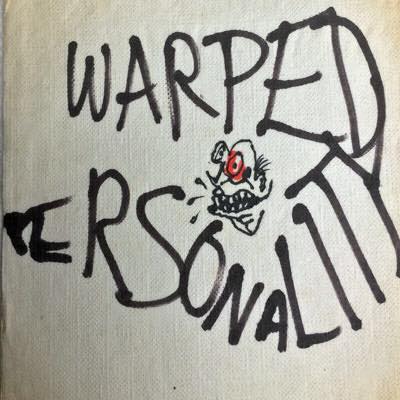
Sea Gull Cellar Bar Napkin Art, artist unknown
The Way It Is
William Stafford
There’s a thread you follow. It goes among
things that change. But it doesn’t change.
People wonder about what you are pursuing.
You have to explain about the thread.
But it is hard for others to see.
While you hold it you can’t get lost.
Tragedies happen; people get hurt
or die; and you suffer and get old.
Nothing you do can stop time’s unfolding.
You don’t ever let go of the thread.
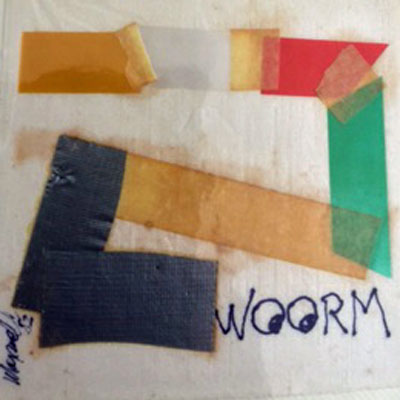
Sea Gull Cellar Bar Napkin Art, James Maxwell artist
Cantares… (Songs….Machado’s Testament)
Antonio Machado
All goes, and all remains,
but our task is to go, to go creating roads
roads through the sea.
My songs never chased
after glory to remain
in human memory.
I love the subtle worlds
weightless and charming,
worlds like soap-bubbles.
I like to see them, daubed
with sunlight and scarlet,
quiver, under a blue sky,
suddenly and burst… I never chased glory.
Traveller, the road is only
your footprint, and no more;
traveller, there’s no road,
the road is your travelling.
Going becomes the road
and if you look back
you will see a path
none can tread again.
Traveller, every track
leaves its wake on the sea…
Once in this place
where bushes now have thorns
the sound of a poet’s cry was heard
‘Traveller there’s no road
the road is your travelling…
’ Step by step, line by line…
The poet died far from home.
Shrouded by dust of a neighbouring land.
At his parting they heard him cry:
‘Traveller there’s no road
the road is your travelling…
’ Step by step, line by line…
When the goldfinch can’t sing,
when the poet’s a wanderer,
when nothing aids our prayer.
‘Traveller there’s no road
the road is your travelling…
’ Step by step, line by line.
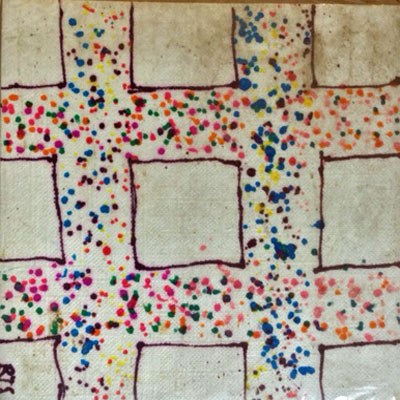
Sea Gull Cellar Bar Napkin Art, RTS artist
Half the People in the World
Yehuda Amichai
Half the people in the world
love the other half,
half the people
hate the other half.
Must I because of this half and that half
go wandering and changing ceaselessly
like rain in its cycle,
must I sleep among rocks,
and grow rugged like the trunks of olive trees,
and hear the moon barking at me,
and camouflage my love with worries,
and sprout like frightened grass between the railroad tracks,
and live underground like a mole,
and remain with roots and not with branches,
and not feel my cheek against the cheek of angels,
and love in the first cave,
and marry my wife beneath a canopy
of beams that support the earth,
and act out my death, always
s till the last breath and the last words and without ever understanding, and put flag
poles on top of my house
and a bomb shelter underneath. And go out on roads
made only for returning and go through
all the appalling stations— cat, stick, fire, water, butcher,
between the kid and the angel of death?
Half the people love,
half the people hate.
And where is my place between such well-matched halves,
and through what crack will I
see the white housing projects of my dreams
and the barefoot runners on the sands
or, at least, the waving kerchief
of a girl, beside the ancient hill?
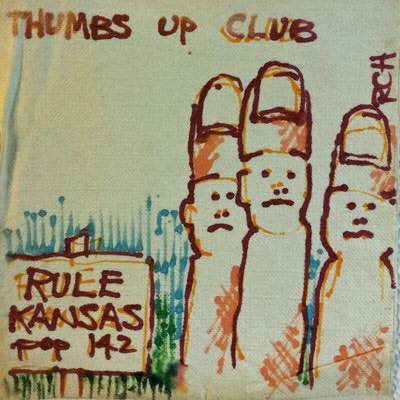
Sea Gull Cellar Bar Napkin Art, Roy Hoggard artist
Narcissus
David Ferry
There’s the one about the man who went into
A telephone booth on the street and called himself up,
And nobody answered, because he wasn’t home,
So how could he possibly have answered the phone?
The night went on and on and on and on.
The telephone rang and rang and nobody answered.
And there’s the one about the man who went
Into the telephone booth and called himself up,
And right away he answered, and so they had
A good long heart-to-heart far into the night.
The sides of the phone booth glittered and shone in the light
Of the streetlight light as the night went echoing on.
Out in the wild hills of suburban New Jersey,
Up there above South Orange and Maplewood,
The surface of a lonely pond iced over,
Under the avid breath of the winter wind,
And the snow drifted across it and settled down,
So at last you couldn’t tell that there was a pond.
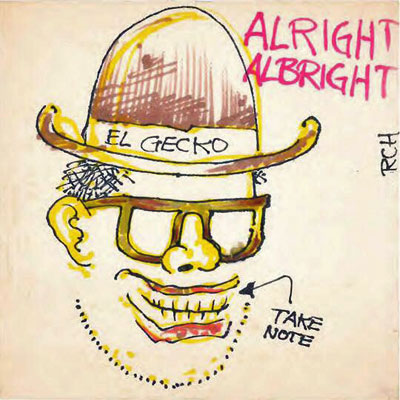
Sea Gull Cellar Bar Napkin Art, Roy Hoggard artist
Looking for Doorkins
Julia Bird
I started with Shakespeare. His alabaster lap
must, I thought, provide the ideal spot
for a cat the color of rain on stone to sleep.
She wasn’t there. Nor could I find her stretched out
in the chapel or curled among the tombs.
or tucked like a hassock underneath a pew.
The candle flames I saw were candle flames
and not the flicker of a feral, feline eye.
So now, you try. You play this game of hide
and seek. That squeak in the organ – was it her?
Is that her in the scratches on the Bishop’s Throne?
Stand by a stained glass window, count to a hundred
and perhaps you’ll see her padding by, her fur
a flare of green and gold and purple sun.

Sea Gull Cellar Bar Napkin Art, Roy Hoggard and Richard Albright artists
Smokers of Paper
By Cesare Pavese
Translated by Geoffrey Brock
He’s brought me to hear his band. He sits in a corner
mouthing his clarinet. A hellish racket begins.
Outside, through flashes of lightning, wind gusts
and rain whips, knocking the lights out
every five minutes. In the dark, their faces
give it their all, contorted, as they play a dance tune
from memory. Full of energy, my poor friend
anchors them all from behind. His clarinet writhes,
breaks through the din, passes beyond it, releasing
like a lone soul, into a dry, rough silence.
The poor pieces of brass have been dented too often:
the hands working the stops also work in the fields,
and the obstinate brows stay fixed on the ground.
Miserable worn-out blood, weakened
by too many labors—you can hear it groan
in their notes, as my friend struggles to lead them,
his own hands hardened from swinging a hammer,
from pushing a plane, from scraping a living.
He’s lost all his old comrades, and he’s only thirty.
Part of the postwar group that grew up on hunger.
They all came to Turin, to look for a life,
and discovered injustice. He learned, without smiling,
how to work in a factory. He learned how to measure
the hunger of others with his own fatigue—
injustice was everywhere. He tried to find peace
by walking, at night, down streets without ends,
half-asleep, but found only thousands of streetlamps
blazing down on iniquity: hoarse women and drunks,
staggering puppets, far from their homes, He came,
one winter, to Turin—factory lights, smoke and ash—
and he learned what work is. He accepted that work
was part of a man’s hard fate; if all men did that,
there just might be some justice in this world.
And he found new comrades. He suffered their long words,
he listened and waited for them to be over.
He made them his comrades. Families of them
in each house, the city surrounded by them, the face
of the world covered with them. And each of them
felt desperate enough to conquer the world.
They sound harsh tonight, despite all the time
he spent coaching each player. He ignores the loud rain
and the flickering lights. His face is severe,
fixed on some grief, almost biting the mouthpiece.
I’ve seen this expression before, one evening, just us
and his brother, who’s ten years sadder than him.
We were up late in the dim light, the brother studying
a lathe he had built that didn’t work right,
and my poor friend cursing the fate that kept him there,
bound to his hammer and plane, feeding a pair
of old people he never asked for.
That’s when he yelled
that it wasn’t fate that made the world suffer
or made the daylight spark blasphemous outbursts:
man is the guilty one. If we only could just leave,
and be hungry and free, and say no
to a life that uses our love and our piety,
our families, our patches of dirt, to shackle our hands.
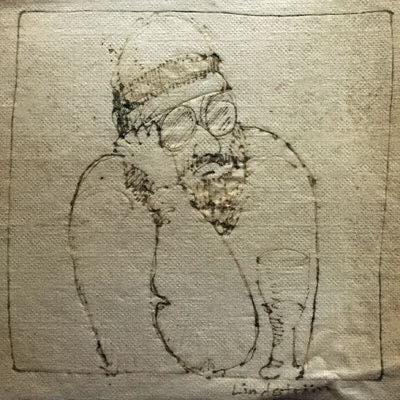
Sea Gull Cellar Bar Napkin Art, Sandra Lindstrom artist
Living With the News
W.S. Merwin
Can I get used to it day after day
a little at a time while the tide keeps
coming in faster the waves get bigger
building on each other breaking records
this is not the world that I remember
then comes the day when I open the box
that I remember packing with such care
and there is the face that I had known well
in little pieces staring up at me
it is not mentioned on the front pages
but somewhere far back near the real estate
among the things that happen every day
to someone who now happens to be me
and what can I do and who can tell me
then there is what the doctor comes to say
endless patience will never be enough
the only hope is to be the daylight
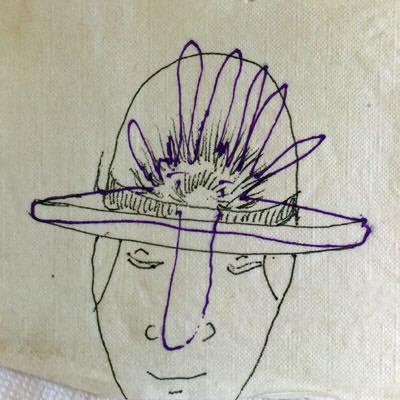
Sea Gull Cellar Bar Napkin Art, artist unknown
Nine Haiku
Matsuo Basho
(various translators)
Cedar umbrellas, off
to Mount Yoshimo for
the cherry blossoms.
Temple bells die out.
The fragrant blossoms remain.
A perfect evening!
Wrapping dumplings in
bamboo leaves, with one finger
she tidies her hair
The shallows –
a crane’s thighs splashed
in cool waves
On the white poppy,
a butterfly’s torn wing
is a keepsake
On the cow shed
A hard winter rain;
Cock crowing.
The banana tree
blown by winds pours raindrops
into the bucket
under my tree-roof
slanting lines of april rain
separate to drops
Awake at night–
the sound of the water jar
cracking in the cold.
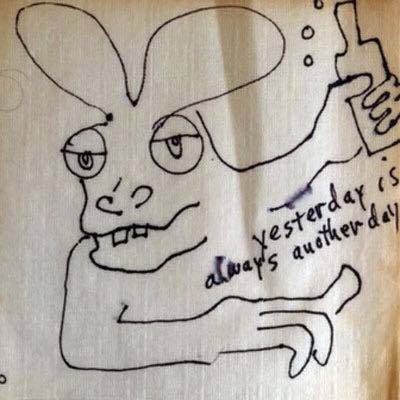
Sea Gull Cellar Bar Napkin Art, artist unknown
A New Poet
Linda Pasten
Finding a new poet
is like finding a new wildflower
out in the woods. You don’t see
its name in the flower books, and
nobody you tell believes
in its odd color or the way
its leaves grow in splayed rows
down the whole length of the page. In fact
the very page smells of spilled
red wine and the mustiness of the sea
on a foggy day – the odor of truth
and of lying.
And the words are so familiar,
so strangely new, words
you almost wrote yourself, if only
in your dreams there had been a pencil
or a pen or even a paintbrush,
if only there had been a flower.
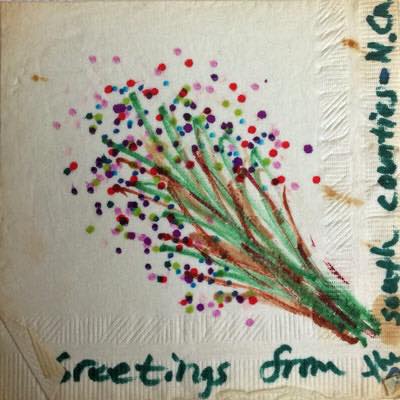
Sea Gull Cellar Bar Napkin Art, artist unknown

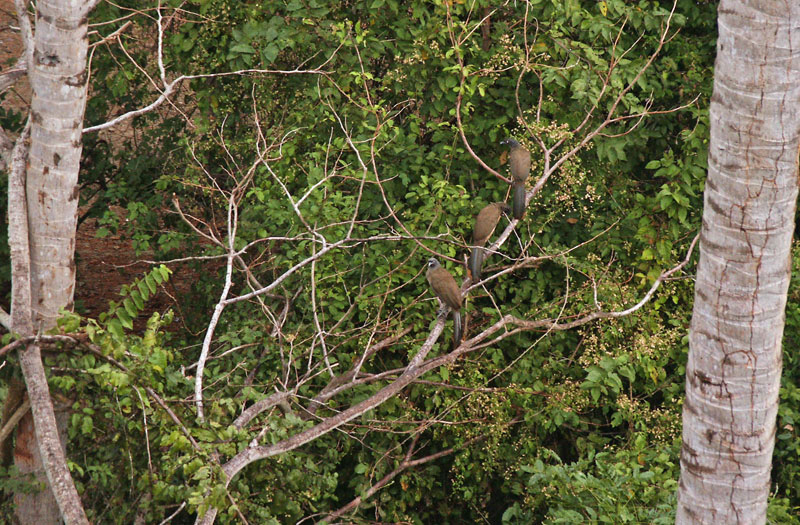
Love it all
“EASTER,EASTER
,EASTER DAY
HERE COMES THE BUNNY
SO BRIGHT
SO GAY!!!
2ND GRADE 1949
(of course none of us knew what “gay” would come to mean!)
Who would have thunk you’d be published on this prestigious website 69 years later !